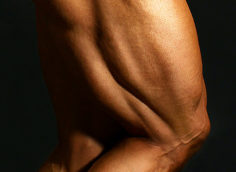Partial Rep Triceps Extensions: Twice the Gains
Partial rep training has been used to supplement full range of motion training for decades. It has several benefits:
- Constant tension
- Blood flow occlusion
- Reduced joint stress
- The ability to push your set past failure
But it's always been just that – a supplement. Now a new study shows how this could be a primary training method if your main goal is muscle growth.
The Study
The study took 44 men with at least a year of resistance training experience and separated them into two groups. Each group did triceps extensions (skull crushers):
- Group 1: Partial range of motion – Elbow range: 45 to 90 degrees
- Group 2: Full range of motion – Elbow range: 0 to 120 degrees
They both completed 3 sets of 8 reps at an 8 RM. The reps were performed with a 1-second eccentric (negative) and a 1-second concentric (lifting) cadence. Rest was one minute between sets. They trained three times per week for 8-weeks.
At the end of the study, estimated triceps cross sectional area increased significantly in both groups, but there were huge differences:
- The partial range of motion group increased about 49%.
- The full range of motion group increased about 28%.
So, the partial range group saw nearly twice the hypertrophy gains!
Partial range of motion lifting is no joke. For exercises like the lying barbell triceps extension – where it can be difficult to keep tension throughout the rep – partials might be a better option.
Reference
- Goto, M., Hamaoka, T., Maeda, C., Hirayama, T., Nirengi, S., Kurosawa, Y., Nagano, A., & Terada, S. (2017). Partial range of motion exercise is effective for facilitating muscle hypertrophy and function via sustained intramuscular hypoxia in young trained men. The Journal of Strength & Conditioning Research, DOI: 10.1519/JSC.0000000000002051




